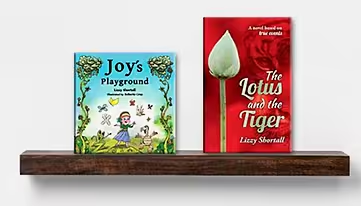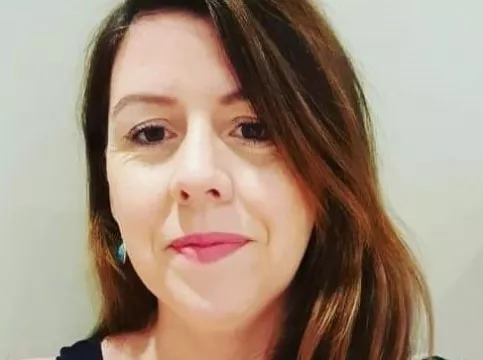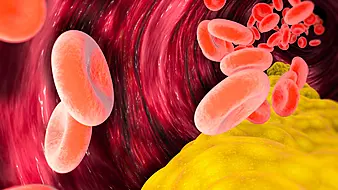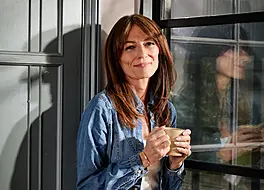When lockdown hit, Kilkenny-based author Lizzy Shortall used it as an opportunity to finish her first novel after six years of work, which also helped her deal with the grief of losing her brother Lar to suicide.
The Lotus and the Tiger, a fictional novel but with parts based on the author's life, follows Lucy Woodrow, a life-loving Dublin girl, who tries hard to make sense of her life and her family.
Ms Shortall told BreakingNews.ie: "I was lucky during the pandemic to get a book out, it’s my first novel, it took me six years to write because I had two babies and had moved county along with work.
"I finished it during lockdown because I had time on my hands like everybody else."
Grief
"The best way to describe it is fiction based on true events, some things that have happened in my life. The Lotus represents a grief journey that the main character Lucy goes through and the Tiger kind of represents the demons that she slays.
"My brother died by suicide in 2004, when I was pregnant with my first child I was only really starting to grieve, thinking ‘they’re never going to meet’ and all that. At that time I was doing a creative writing course and I just started writing about him and growing up together and all of that, over the next six years it turned into a novel about a lot of different things. A woman who goes on these adventures, and she goes back and forth to Thailand three times, and you get to see all the good stuff and then how she struggles with grief and comes out the other side.
"It was very therapeutic and when I was finished writing it I kind of realised, ‘oh that book is about grief', it was never meant to be about that, but a big thread is coming out of traumatic grief. I went to Thailand three times and the first time and second time was party central, full moon parties, and the third time I went I was alone.
"I had kept busy after he died, I went back to college, and I was working, and suddenly I was in Thailand on my own looking around thinking ‘has this place declined in seven years?’ I thought it was sun bleached or something, and then I realised it was me, I wasn’t very happy, I was seeing everything through a black and white lens because I was bereaved, and I hadn’t processed it. I started to think, ‘you know what, Lar would want me to be happy, and it’s time to try and let him go’, so I did a ritual in a temple with this Lotus and that’s where that part comes out of it. Afterwards, by the time I had finished writing it I felt like I had really processed the grief."

Since then, Ms Shortall went on to publish her first children's book, Joy's Playground, in October.
She is a mother to two young girls, and her eldest daughter helped her with the creative process.
Ms Shortall also works as an emotional wellness and mindfulness trainer and Joy's Playground aims to teach children "mindfulness, gratitude and self belief".
"Joy is in the playground with her friends, and they meet a mixed up monkey who learns about mindfulness, a grumpy giraffe who learns about gratitude, and a scared squirrel who learns about self belief, so it’s a fun story they can learn these skills with.
"The older one helped me write it, she’s six, she helped pick the names and helped with the story, so they brought it into school and the local schools and pre-schools are using it, so that’s great.
"I’m doing a second children's book with my other daughter which is also going to be to support children’s emotional wellbeing. I don’t see me doing more than two kid’s books, but I’d love to write more novels.
"It’s amazing and their imagination is so good, the things they come out with and the way they see and understand things, I don’t think it would have been half as good without their input, they’ve been so excited to see other people sending us pictures with it, or in the shops, and other people meeting the animal friends they’ve created."
Ms Shortall worked in social work for years before becoming a mindfulness trainer.
"I worked in social care first for years and I thought when I went into social work that I’d get to work on resilience training courses with people and teach them coping skills and do mindfulness and all of this. But as a social worker you really are fire fighting, and it’s a lot of case management and your time with people can be more limited than you want it to be. I worked in the areas of mental health, oncology, children in care, addiction, and it was really evident to me that it would be lovely if we could work on the prevention side more.
"Teaching people these coping skills so that when something happens, like myself I didn’t have the coping skills I needed when Lar died, I was at a loss for quite a while trying to figure out how to cope, and I think if we could instil these skills in people and children earlier then it’s going to make life a lot easier, so I decided to step out of social work and provide a resilience training service where people could come to me one-to-one."
Mindfulness
So what is mindfulness?
"Mindfulness is paying attention, on purpose in the moment without judgement, so it’s kind of like this is where I’m at," Ms Shortall explained. "If you’re not feeling great, judging yourself or being hard on yourself, it’s about just saying 'OK I’m having a bad day, that’s OK'.
"Or if something good is happening it’s about being present to enjoy it, so instead of focusing on the past or the future. A big thing that I use a lot with people, I incorporate it a lot in my book, is using the five senses to bring yourself back into the moment.
"Simple techniques like what do I see, hear, taste, smell and feel, if you focus on that it will bring you right back to where you are, and most of the time the moment is OK, a lot of anxiety comes from our thought pattern and of course there is anxiety-inducing things going on at the moment. I had a lot of anxiety myself when I was in college and that’s how I got into mindfulness in the first place."
Meditation is the formal practice of mindfulness, and while it helps a lot of people, others don't have the time, and Ms Shortall feels that mindfulness can be enough to help plenty of people overcome anxiety and negative thinking.
She feels mindfulness and resilience tools should be thought from an early age, especially as we come out of the pandemic which has been an isolating experience for a lot of people.
"Resilience is the ability to bounce back to where you were before something or to bounce back well, so it’s not just the ability to recover but to recover well. Resilience tools will help us to do that after Covid and mindfulness would be one of those tools.
"My own mental health deteriorated after my brother died because I didn’t have good coping skills, I’m a quite determined person and I made sure I found out how to cope even though it took me some time.
"I think there are a lot of teachers out there with great awareness, but it has to incorporated into the curriculum, so the teachers have the time. I think a lot is being done in Transition Year which is great, but we still need to get in there younger, primary school time. Because it's left up to teachers, some local primary schools and pre-schools are currently using Joy's Playground."
Ms Shortall describes writing as her passion, and she hopes there will be more books to follow The Lotus and the Tiger.
If you have been affected by any of the issues raised in this article, you can freephone the Samaritans 24 hours a day for confidential support at 116 123 or email jo@samaritans.org.
You can also freephone the national Bereavement Support Line run by the HSE and Irish Hospice Foundation at 1800 80 70 77 (Monday-Friday 10am-1pm), and the contact information for a range of mental health supports is available at mentalhealthireland.ie/get-support/. In the case of an emergency, or if you or someone you know is at risk of suicide or self-harm, dial 999/112.







